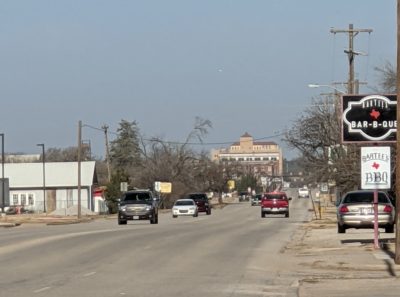This post describes, my recovery from the loss of my wife to a degenerative neurological condition called Huntington’s Disease. She was healed of this condition when she went to live with our Heavenly Father at 2:30AM, the 10th of January 2021. You can read the announcement here.
Or if you would like to read our story from the beginning, you can start with: How We Got Here…
As we continue getting settled in, the place is really beginning to come together. This afternoon (Sunday) we will be getting our washer and dryer delivered. They are both made by LG and while I have never owned one of their appliances before, I did have a couple LG phones that I really liked, so I’m hopeful.
I mentioned last week that a dear friend’s daughter died of HD. Well this week there were visitation hours over in the Dallas area so I attended. I am so glad I did!
In business there is the term, “flying the flag” that refers to attending a meeting with little or no expectation of really doing anything useful, but you go because you feel you need to. As I was driving to the visitation I was feeling on some level that this was a bit of a “flying the flag” kind of trip. I was going because she was a dear friend and I wanted to be there to help support her but I had no idea what that would look like. Plus, to be honest, there was a certain amount of apprehension as well. After all, we had never actually met so I guess on some level you never really know, do you?
But what I found was very different from those worrisome thoughts. Jean is as wonderful a lady in person as she is online, and her family is great too. Turns out that her daughter taught at a local Christian school and a lot of former students were stopping by to pay their respects – which says a lot about who she was during her life here on earth. But more importantly, attending the visitation really did accomplish some things that were very positive.
In case you didn’t know, Janet donated her body to the local medical school to help train future doctors in anatomy. Consequently, when Janet died, her “final arrangements” consisted of calling a pager number and telling the school where they could pick up the body. There was, therefore, no visitation, no memorial service, and no funeral – just a phone call and a pickup by a local mortuary. In six months to a year when the school is done with Janet’s body they will cremate what is left and send the ashes to us via UPS.
Now don’t get me wrong, her body donation made the time immediately following her death much more bearable. Moreover, I am so glad that she made that choice because it was a perfect expression of her life and attitude. But there were also negatives to that decision. For instance, seeing her body in a casket would have provided a certain kind of closure, which Frannie and I missed.
But in the end, while I benefited from this visitation greatly, this visit wasn’t about me. The primary goal was still to support Jean and her family. I have never met IRL (In Real Life) someone that I had first met online. Hence, one thing I became aware of was that, for me at least, the initial meeting felt a tad awkward. We had talked so many times, about all manner of things, so in one way it seemed like we were old friends, but in another way we were just meeting. Still, we had time to share blessings and challenges, and I felt very blessed by the time together – and hope Jean did too.
On a completely different track, this week I realized a couple of other nice things about living in a small town like Mineral Wells. First, at night it gets really dark so you can see so many stars, it is incredible! Second, it is quiet. When we were living in Pearland, the TV volume was typically set around 30 to 40 on a 100-point scale. Here in Mineral Wells, with the same TV displaying the same programming, I have the volume set between 10 and 12.
❦ ❦ ❦ ❦ ❦ ❦
Many years ago, a common gift idea for newlyweds was “His ‘n’ Hers” gifts. At one time, nearly anything that both members of the couple could use came in special monogrammed versions. However, linens were often the most common of such gift idea – and the most practical. When Janet and I were married, Janet’s best friend (and Frannie’s future godmother and namesake) gave us a set of monogrammed towels and washcloths from LL Bean. Amazingly, some of the towels survive to this day.

That towel serves as a reminder to me that as a married couple there are certain things that we should share. However, one thing that we should not share is symptoms – and sometimes when caring for someone 24/7 it is hard to avoid that sort of “togetherness.”
The first time I ran into this effect was with my first wife’s mother. All mother-in-law jokes aside, she was one of the most emotionally hardened, manipulative, bigoted people I ever had the displeasure to meet. She would come home at night laughing about how she had twisted a person’s words and manipulated situations to accomplish what she wanted – oh, and did I mention that she worked in Child Protective Services? Sweet, right?
From day one, she angered me and I was offended by her warped sense of ethics that allowed her to do things like tell her daughter that if her future son-in-law had a black best man she was going to walk out on the ceremony. It’s a long story, but I didn’t find out about it until years later. When I did, I blew my stack, and had to deal with her retribution for years. Which is another long story.
The point is that the more I thought about what she had done, the more emotionally hardened I became. When I realized what was happening, I was confused. How could I become like the person I disliked so much? But then I was going through some counseling, and the therapist explained it to me. She said that at the subconscious level our mind doesn’t understand right and wrong, so if it sees me focusing on something a lot – like what a jerk my ex’s mother was – it would figure, “Oh, that’s what Mike wants to emulate,” and start moving me emotionally in that direction.
But this principle also appears in other places – like in the Scriptures where Paul gives us the prescription for preventing the problem: “Focus your mind on things above, not on things on the earth.” Col 3:2.
In other words, concentrate on the good stuff, and the best of the good stuff is our Creator.
While this is an important lesson for everyone, I think that it is particularly critical for caregivers. On the support forums you are inundated with people asking for help with a loved one who is becoming increasingly argumentative, judgmental, and accusatory. Sometimes you see that the original poster has started mirroring their loved one’s emotional state – which the loved one sees and can, in turn, react to by amplifying their behavior.
So ‘round and ‘round she goes,
and where she stops, nobody knows.
Compounding this tragedy is that the emotional responses that started the cycle in the first place weren’t even real, but the symptom of a disease. So they end up with His ‘n’ Hers symptoms. What is needed is a way to break the cycle of ever-worsening actions and reactions – and Paul’s prescription is an excellent tonic. But it will require letting go of some stuff before you can experience its salutary effect.
For example, there’s the attitude that says, “Well they started it! They have to say, ‘I’m sorry’ first.” Of course there are two immediate problems with that perspective.
First, you probably aren’t five years old any more. Do I really need to go into more detail here?
Second, the person who you are wanting the apology from is ill. Often things like repentance, logic, and even “common sense” are all things that they simply don’t possess any more. Sometimes expecting them to behave in a different way is akin to asking a paraplegic to run a 100-yard dash.
The other factor that plays in here is forgiveness. Very often as a caregiver you truly have been wronged by the person that you are caring for, and that injury must be dealt with. Thankfully we live in a world where our Creator has also made true forgiveness available, and it is only that forgiveness that has the power to wipe the slate clean and give us a fresh start – both with Him, and with our fellows.
In Christ, Amen ☩
❦ ❦ ❦ ❦ ❦ ❦
A prayer for when you are feeling short of patience…
“Blessed are You, Lord God, King of the Universe. It is right that I should at all times and in all circumstances bless You for Your compassion and forgiveness. I know firsthand how healing the words, ‘I forgive you,’ can be. So today I want to bless You especially for the gift of being able to forgive others. Thank You for making available the blessing of forgiveness to all. Amen.”

